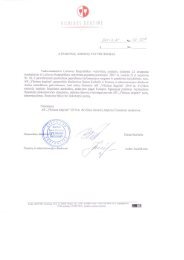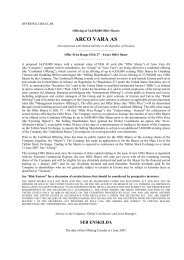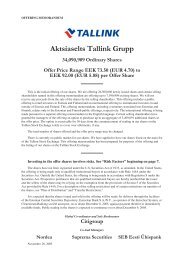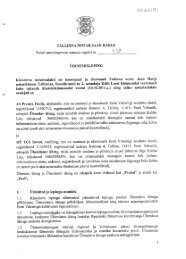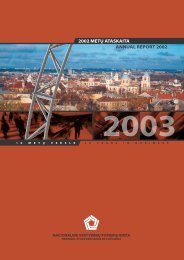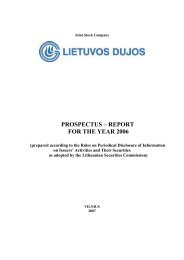AB „SNAIGĖ“ - NASDAQ OMX Baltic
AB „SNAIGĖ“ - NASDAQ OMX Baltic
AB „SNAIGĖ“ - NASDAQ OMX Baltic
Create successful ePaper yourself
Turn your PDF publications into a flip-book with our unique Google optimized e-Paper software.
Consolidated annual report for year 2008<br />
PRINCIPLES/ RECOMMENDATIONS<br />
2.1. Besides obligatory bodies provided for in the Law on<br />
Companies of the Republic of Lithuania – a general<br />
shareholders’ meeting and the chief executive officer, it is<br />
recommended that a company should set up both a collegial<br />
supervisory body and a collegial management body. The<br />
setting up of collegial bodies for supervision and<br />
management facilitates clear separation of management and<br />
supervisory functions in the company, accountability and<br />
control on the part of the chief executive officer, which, in<br />
its turn, facilitate a more efficient and transparent<br />
management process.<br />
2.2. A collegial management body is responsible for the<br />
strategic management of the company and performs other<br />
key functions of corporate governance. A collegial<br />
supervisory body is responsible for the effective supervision<br />
of the company’s management bodies.<br />
2.3. Where a company chooses to form only one collegial<br />
body, it is recommended that it should be a supervisory<br />
body, i.e. the supervisory board. In such a case, the<br />
supervisory board is responsible for the effective<br />
monitoring of the functions performed by the company’s<br />
chief executive officer.<br />
2.4. The collegial supervisory body to be elected by the<br />
general shareholders’ meeting should be set up and<br />
should act in the manner defined in Principles III and<br />
IV. Where a company should decide not to set up a<br />
collegial supervisory body but rather a collegial<br />
management body, i.e. the board, Principles III and IV<br />
should apply to the board as long as that does not<br />
contradict the essence and purpose of this body. 2<br />
YES/NO<br />
/NOT<br />
APPLIC<strong>AB</strong>LE<br />
COMMENTARY<br />
NO Upon the decision of the shareholders since May 2006 the<br />
Supervisory Board is not formed.<br />
YES The Board of the Company is responsible for the formation of<br />
the Company‘s operational strategy, organisation of the<br />
enforcement thereof, the representation and the protection of<br />
the shareholders‘ interest.<br />
NO Only the Board is formed in the Company (upon the<br />
shareholders’ decision of May 2006).<br />
YES These principles apply to the Board to the extent they do<br />
not contradict the essence and the purpose of the Board.<br />
2 Provisions of Principles III and IV are more applicable to those instances when the general shareholders’ meeting elects the<br />
supervisory board, i.e. a body that is essentially formed to ensure oversight of the company’s board and the chief executive officer and<br />
to represent the company’s shareholders. However, in case the company does not form the supervisory board but rather the board,<br />
most of the recommendations set out in Principles III and IV become important and applicable to the board as well. Furthermore, it<br />
should be noted that certain recommendations, which are in their essence and nature applicable exclusively to the supervisory board,<br />
should not be applied to the board, as the competence and functions of these bodies according to the Law on Companies of the<br />
Republic of Lithuania (Official Gazette, 2003, No 123-5574) are different. For instance, item 3.1 of the Code concerning oversight of<br />
the management bodies applies to the extent it concerns the oversight of the chief executive officer of the company, but not of the<br />
board itself; item 4.1 of the Code concerning recommendations to the management bodies applies to the extent it relates to the<br />
provision of recommendations to the company’s chief executive officer; item 4.4 of the Code concerning independence of the<br />
collegial body elected by the general meeting from the company’s management bodies is applied to the extent it concerns<br />
independence from the chief executive officer.<br />
Prepared by U<strong>AB</strong> FMĮ „Orion Securities“ p. 38





